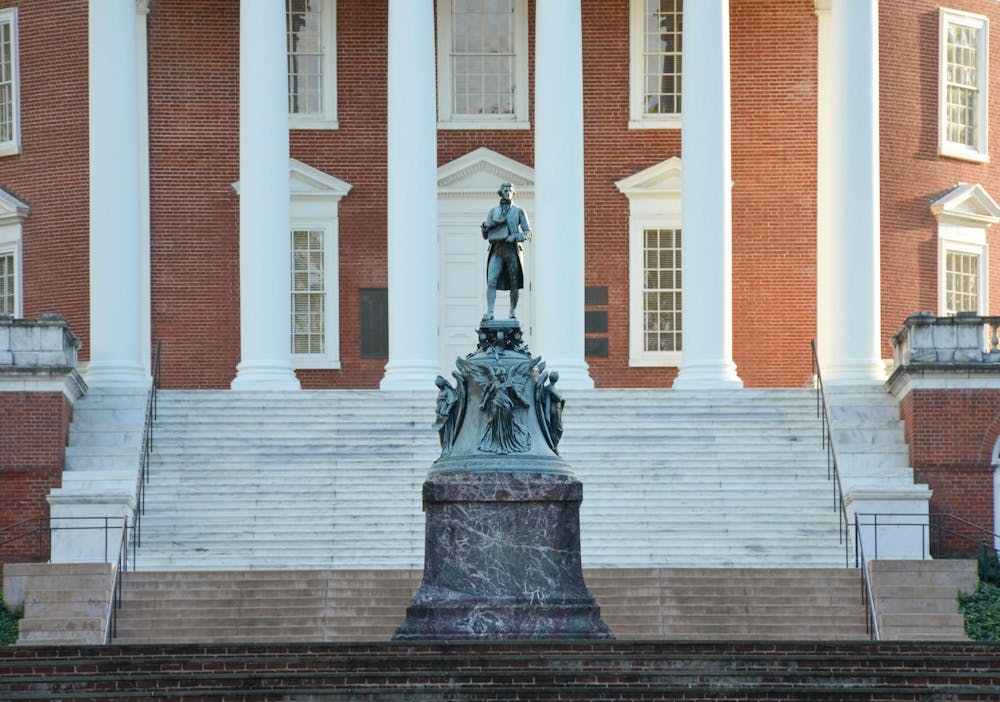The shameful assassination of Charlie Kirk has brought out both the best and the worst of political conversation in America. Politicians on both sides of the aisle have used the traumatic and reprehensible event to urge political unity and to denounce political violence. On the other hand, Gov. Glenn Youngkin and President Donald Trump have used Kirk’s killing to advocate for the censorship of political disapproval. Choosing to follow in their footsteps, the College Republicans sent a letter to Interim President Paul Mahoney and the Board of Visitors pushing them to punish those they believe have justified Kirk’s killing. This letter to University administration is an affront to the principles of open discussion at the University. With their calls for administrative consequences, the CRs thumb their noses at the Jeffersonian principles of free speech that this University was founded to defend.
The force of the CRs’ letter is undermined both by the deeply ironic nature of its content and the fact that it comes from an organization rhetorically dedicated to Jefferson’s teachings. It demands that the University discipline those who have “justified or called for violence” in the name of “free speech and democracy.” While supporting violence is certainly repugnant — and explicitly advocating for imminent violence is unlawful — being able to openly and generally speak about the death of a public figure is certainly permitted speech. Though they might not like what is being said, the CRs should still be able to see the absurdity of advocating for government intervention in the name of open dialogue.
Created at a time when America’s identity of relative political freedom was still being discovered, the University has long worked to champion the principles of free speech and open expression as some of its core values. Thomas Jefferson proclaimed that “this institution will be based on the illimitable freedom of the human mind,” and that this freedom can only be unlocked if the University fosters an environment where community members can challenge speech with contrary views. If speech is forbidden, claims cannot be tested, and knowledge does not advance. The CRs’ letter advocates for the easy shortcut to this admittedly uncomfortable process — instead of affording speech the chance to be probed and scrutinized, their letter pushes the University to silence it from the outset.
Kirk’s highly public espousal of controversial views often left many with a bad taste in their mouth. Yet, the distastefulness of speech lends to its argument for protection. If the only speech that was allowed was that which most agreed with, free speech would be a hollow truism — no one calls to silence speech they agree with. Despite the belief of some that speech can be declared impermissible because of its unappealing content and audience size, the unattractiveness is precisely what makes it permissible.
Open dialogue cannot exist at the University when speech that one side finds objectionable is curtailed. Republicans used to grumble about the “cancel culture” liberals created in the wake of the social justice movements of the past decade. Yet, when afforded the opportunity, Republicans have found the exact same appeal in the practice. Their rebranding of it as “consequence culture” does not make it any less laughable as an example of political hypocrisy.
This insincerity is understandable for politicians — it is something of a cliché in today’s world. Yet, Republicans at the University are not politicians — they should be wary of haphazardly falling into lockstep with politicians' views on sensitive topics, especially when those views turn out to be nonsensical. At a University where honor and integrity are at the forefront of all pursuits, students should feel able to practice ideological consistency in a way politicians perhaps cannot.
The CRs’ letter to the University shows ignorance of the recent decline in reputation the University has suffered regarding free speech. The University has a checkered past regarding speech intolerance, whether it be the administrative confrontation of a protester or punishing a student for her remarks about protesters. Students do not have to search too far in the past to find a situation where speech was curtailed. This reality is reflected in the University’s abysmally low rating from the Foundation for Individual Rights and Expression, which ranked the University 21st out of 257 institutions — in 2024, the University was first. The CRs’ letter embodies this fall into disrepute. Instead of irresponsibly asking the University to engage in more self-destructive behavior, the CRs should be fighting for the University to regain its status as a bastion of free discussion.
Charlie Kirk proclaimed the value of free speech more than anyone. His campus visits, while often devolving into adversarial matchups, had at least the resemblance of honest political debate. And while his assassination should be deplored on a moral level by all who value political discourse, using his killing as a pretext to suppress discussion flies in the face of all Kirk claimed to support, and that the University should uphold. At an institution founded on time-honored traditions of free speech, where the community is “not afraid to follow truth wherever it may lead,” the least the CRs could do is pretend to advocate for the Jeffersonian principles they preach rather than asking for the University to betray its basic tenets.
Michael King is a senior associate opinion editor who writes about politics for The Cavalier Daily. He can be reached at opinion@cavalierdaily.com.
The opinions expressed in this column are not necessarily those of The Cavalier Daily. Columns represent the views of the authors alone.







